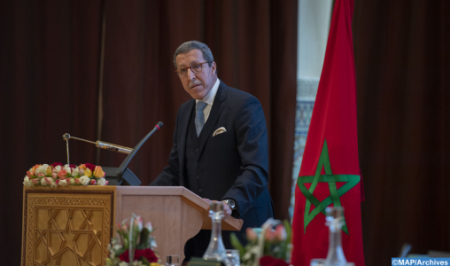Morocco’s Migration Strategy Based on Symbiosis Between Royal Vision, International Agenda – Ambassador to UN
The strategy adopted by Morocco on migration is part of the natural symbiosis between the vision of HM King Mohammed VI and the international agenda on migration, said Omar Hilale, Kingdom’s Ambassador and Permanent Representative to the UN, on Friday. Speaking at the plenary session of the 1st International Migration Review Forum (IMRF), Hilale stressed that the action of Morocco “is neither circumstantial nor opportunistic. It rather embodies a natural symbiosis between principles and projections.” “A symbiosis between the Vision of His Majesty King Mohammed VI combining responsibility and humanism declined in the National Strategy for Immigration and Asylum and the international agenda on migration based on the same values,” he explained during this Forum devoted to the review of the implementation of the Global Compact for Safe, Orderly and Regular Migration adopted in Marrakech in 2018. The ambassador also highlighted “the convergence of the Marrakech Pact with the African agenda on migration, for the promotion of which Morocco works tirelessly under the leadership of His Majesty the King” on the migration issue within the African Union, noting that the promises of the Pact and the African Agenda on migration are complementary. “Therefore, a coherent scheme is emerging around a vision and a conviction,” he noted, citing a passage from a speech by His Majesty King Mohammed VI in which the Sovereign emphasizes: “It is for us to consolidate the coherence between the national, regional and global commitment, and to get closer to the objective of optimizing and organizing migration instead of fighting it.” Hilale noted that Morocco’s commitments in the field of migration are part of this effort. “They meet national needs with international repercussions. They are realistic, ambitious and multipartite, in that they are pan-societal and pan-governmental,” he said. Announcing that migration will be taken into account for the first time in the national census to be conducted in 2024, the Moroccan diplomat also said that a module on international migration will be integrated into the permanent national employment survey. “We will ensure the permanent integration of the human rights dimension in policies affecting migration,” he said, noting that Morocco will implement, with the International Organization for Migration (IOM) and other UN agencies, programs dealing with the impact of climate change on migration and inclusion. He also expressed Morocco’s willingness to provide training on migration in all these expressions to Arab and African francophone countries. Hilale also noted that Morocco advocates for a cross-cutting approach to the migration issue, pointing out that through a look at Africa embodied by the African Migration Observatory in Rabat, Morocco vitalizes knowledge of the facts. “Through the 5+5 configuration at the Mediterranean level, the Kingdom has supported the adoption of a clear roadmap for better governance,” he said, adding that the Kingdom has opted, through the organization of the 1st Conference of the regional review of the Pact in the Arab region, for a coordinated approach and solidarity in a space sedimented with human movements. He also emphasized the need to comply with the spirit and the letter of the Marrakech Pact “for those who try to normalize the migration phenomenon and act with responsibility and humanity.” “For those who try to experience the ambition and ownership, the obligation is to strengthen its commitments qualitatively and quantitatively. For the path that emerges can not be fully surveyed until the implementation of the Pact is not generalized,” said the ambassador, stating that respect for the human rights of migrants, regardless of their status,” is the compass of our common action. Referring to the 1st International Migration Review Forum, Hilale noted that this conclave is synonymous with a multilateral commitment, the result of successive contributions based on consultation, sharing and action. He recalled in this regard the relevance of the Report of the UN Secretary General on the implementation of the Marrakech Pact, which emphasized the imperative of responsible management and solidarity of the migration issue. He also said that the organization of regional meetings has allowed to combine adaptation and ownership by giving the Pact a strong regional dimension, noting that the adoption of the Rabat Declaration of the champion countries of migration has consolidated a movement in progress. “Both a milestone and a new beginning, the first edition of the IMRF is above all an opportunity to measure the implementation of the Marrakech Pact, the breadcrumb trail of our common action,” he said, adding that if the collective commitment is essential, so is the individual responsibility of States. “Taken up by my country at an embryonic stage, the Pact must be constantly irrigated and strengthened,” concluded the ambassador. The 1st International Migration Review Forum, which brought together member states, observers, representatives of the UN system in addition to stakeholder groups, examined progress made at the local, national, regional and global levels in implementing the Marrakech Pact and addressed further concrete actions to better protect and support the world’s more than 281 million migrants through changes in policies and practices. The event culminated in the adoption of an inter-governmentally negotiated declaration on progress.

